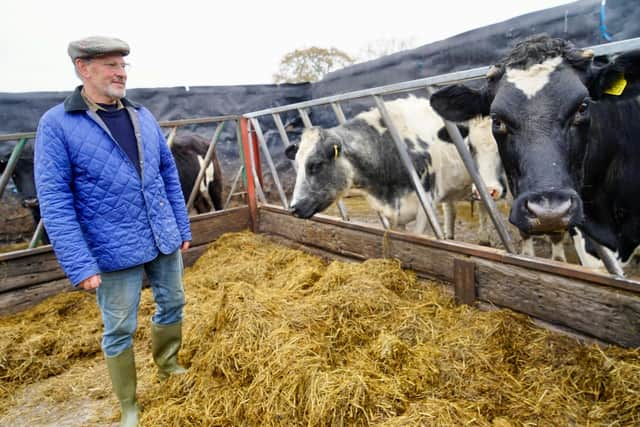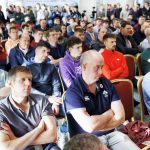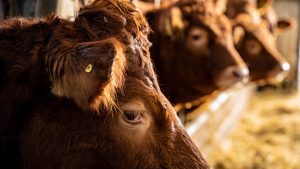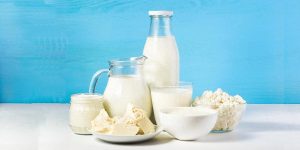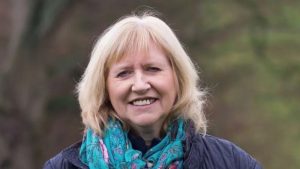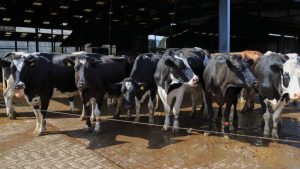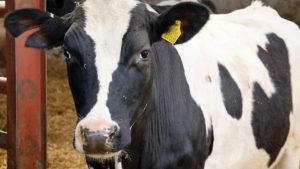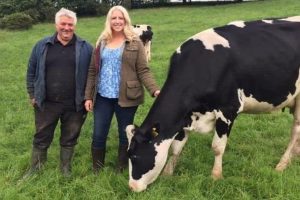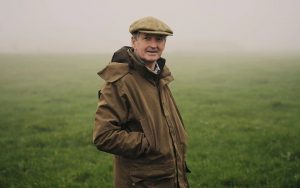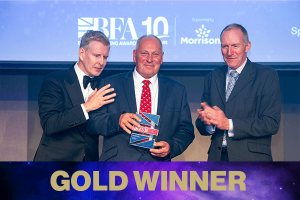
When David Higginbottom, 66, first started working on his father’s Holymoorside Farm, The Yews, there were 30 cows on the 140-acre holding.
During the next few decades he grew this number to over 90 but the ever-decreasing price per litre of milk demanded by the supermarkets had led to “factory” farms with “thousands” of dairy cattle which live their entire lives indoors.
Unable to compete with the sheer quantities of milk produced by the bigger operations, in October the last few litres of milk from The Yews were collected by its dairy buyer.

David now plans to spend his last years on the land raising beef.
Speaking about the of an era, father-of-three David said: “It’s been a dairy farm since before I was born. My father milked cows, I’ve milked cows and the previous person on the farm did as well.
“All the farms in the area years ago used to milk a few cows and now there’s just three left in Holymoorside, but I can’t see there being any in five years’ time. When I first started my father had about 30 cows and we could make a reasonable living.
“Around three years ago I milked 90 cows but over the last three years I’ve steadily reduced the numbers because there’s no-one else to follow me. I finished completely at the end of October – I still have two-three that I’m milking to feed to calves but I gradually worked them down to a dozen.

“Then the dairy company didn’t want to pick the milk up anymore which is fair enough, it wasn’t viable. The way the dairy industry is going, the bigger farms are just getting massively big – it’s more factory farming now because the cattle don’t go outside at all.
“The feed is just brought to them in houses, which to me is wrong because a cow is a grazing animal but that’s the way things are going now.”
David’s plight is not uncommon now as small farms find themselves unable to make a living when the profit margin in a litre of milk is so small that vast quantities are required.

In 2014 David’s son Adam began selling eggs – a sideline which grew into successful farm shop Adam’s Happy Hens. He left dairy faring altogether and runs the business with his partner Harriet.
Dad David said: “Maybe if Adam had been interested we might have expanded and carried on but realistically he’s better with his farm shop because it’s making a reasonable profit. But even if we had doubled the cow numbers we still wouldn’t have been viable – on some farms they’re milking thousands of cows.”
For the foreseeable future David now plans to raise beef. He said: “Its something to fall back on if I can make it work, I couldn’t imagine not farming anymore. I’m sad about the end of the dairy farm because it’s the end of an era – my father milked all his life and I’ve milked for 50 years.
“In 2000 I was getting 32p a litre of milk and I’m now getting about 6p a litre more than then. It’s just not enough – the supermarkets screw you down on price.”

Now that The Yews has stopped producing milk there are just three remaining in Holymoorside, however David believes in five years’ time they will all have stopped.
Many farmers are able to survive nowadays by diversifying, taking advantage of Government subsidies to grow wild plants and trees.
David’s son Adam, speaking about his own situation, said: “The entire reason I started the farm shop is because the dairy farming is no good. I saw it 10 years ago.
“I started the farm shop because I wanted to do something different that held a better future for the farm. All the small dairy farms are having to diversify in one way or another.
“It’s hard for people like my dad because they think we should be producing food.”
Andrew Critchlow, NFU Derbyshire county adviser, said: “We are always sad to hear of a family business that has decided to leave a particular sector especially when it has been part of the farm’s DNA for generations. “This is clearly a business decision that has not been taken lightly but I am pleased to hear the farm will remain busy helping to feed the nation.
“Every farm counts as we look to protect the country’s food security and all sectors have had an exceptionally challenging year because of the poor weather, volatility and spiralling costs, coupled with major changes announced in the Budget last week that seriously threaten farm businesses.
“Derbyshire farmers want to continue to produce safe, affordable, traceable, climate friendly food for people to eat and people who choose British produce enjoy some of the most sustainable fruit, vegetables, dairy and meat products in the world. “Herds come in for the winter, we have a long one ahead, and while we do have all manner of farms in the county, indoor and outdoor grazing, herd health and animal welfare is the top priority for farms, be they big or small.
“We thank county shoppers for their continued support of our farmers and growers who are busy producing food for our tables and caring for the environment. “The NFU is doing everything in its power to help safeguard domestic food supplies and support our farming members across all farming sectors and for those in dairy there has been intense campaigning for many years to call out unfair practices and abuses of power in the dairy supply chain.”
You can now read the most important #news on #eDairyNews #Whatsapp channels!!!
🇺🇸 eDairy News INGLÊS: https://whatsapp.com/channel/0029VaKsjzGDTkJyIN6hcP1K
